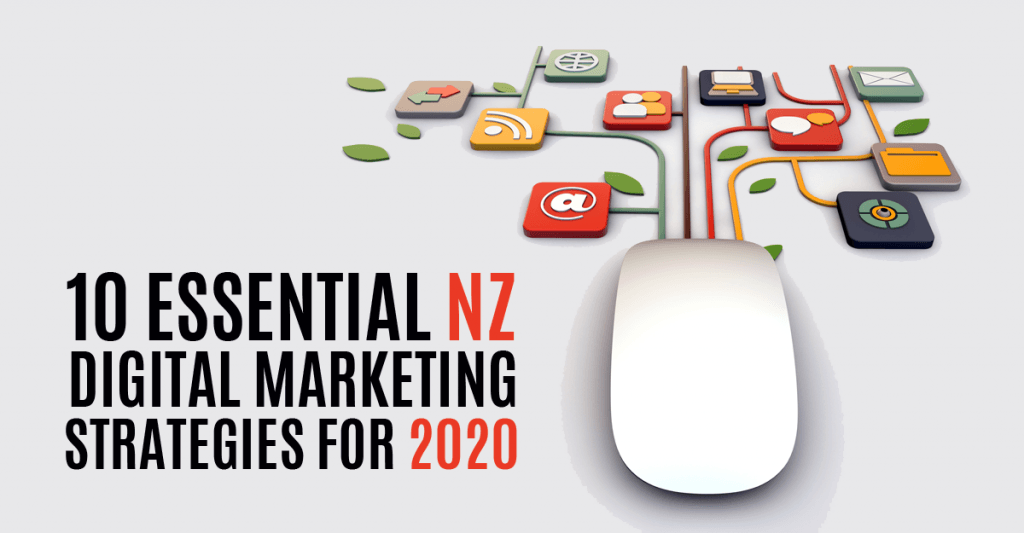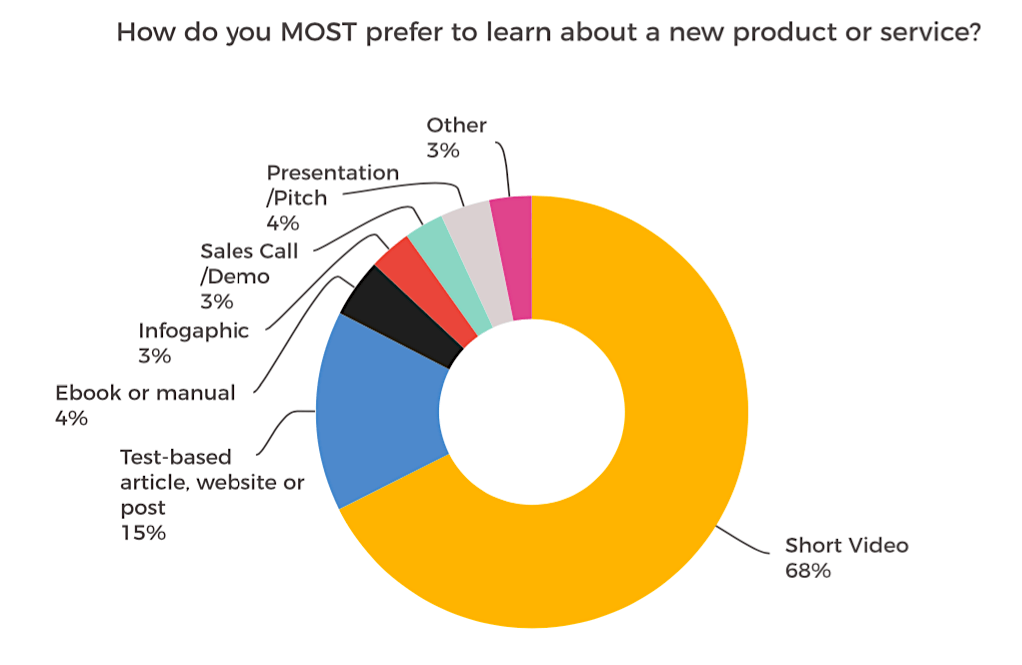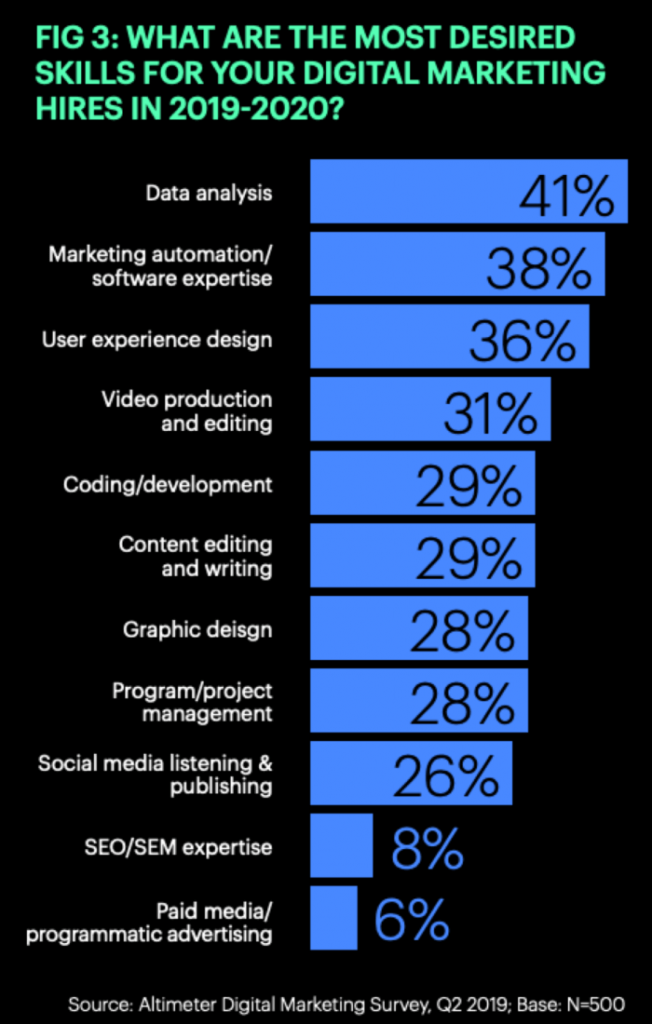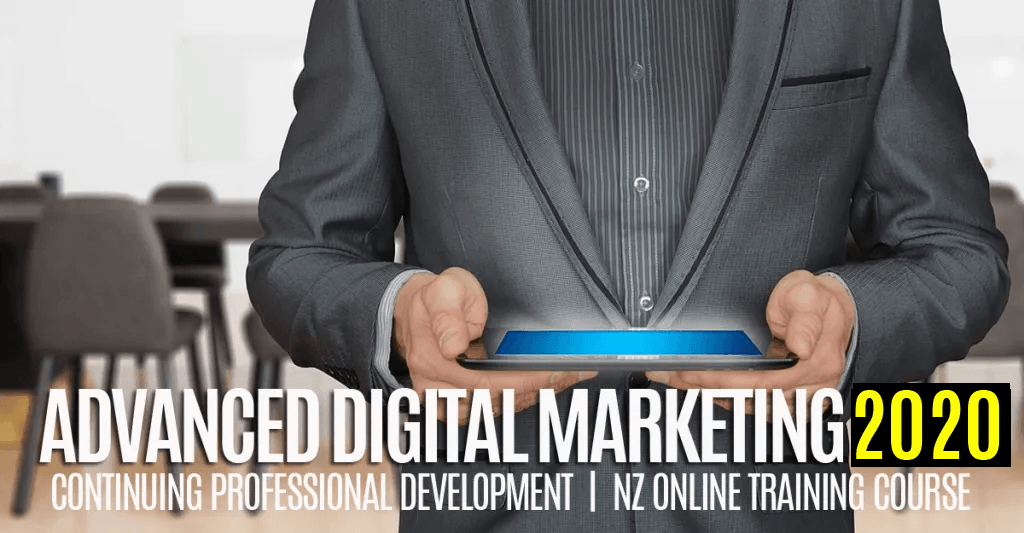Digital Marketing is now New Zealand’s most important and most powerful marketing tool.
Where first Newspapers and then Television ruled the roost, now Digital Marketing dominates the NZ business environment (and has done so since 2015), attracting more dollars and more attention than any other.
If we look back over the last seven years, it’s easy to see the steady growth of digital marketing at the expense of, well, almost everything else:
Okay, that’s not really news. We just wanted to ensure you knew why Digital Marketing matters for Kiwi businesses — and why you should know about our list of 10 essential Digital Marketing strategies for 2020:
1 Focus Upfront: you have just 5 seconds to make an impact
As seasoned YouTube watchers know, most pre-roll advertisements on the video network can be skipped after five seconds, which does not give marketers much time to convince viewers that they should keep watching. It is fascinating to watch as those marketers who have simply uploaded existing TV commercials to YouTube typically fail to capture the attention of their prospective audience.
It’s a funny thing. Commercials that really work hard to entice and intrigue the audience in the first five seconds work well on more than just YouTube. They can also maximise their effectiveness through traditional TV channels — viewers may not have a skip button but they do have a mute, if they are not engaged quickly enough by the commercial chatter.
2 Street Cred: why Micro-Influencers enjoy a disproportionate share of attention
It’s one of those unfortunate facts of life that today’s consumers have trust issues. 92 percent of them trust other consumer recommendations over corporate advertising. Of course, those selfsame consumers aren’t stupid — they do understand that influencers on Instagram or YouTube (or TikTok or Twitch) have been paid to promote products.
Even so, however, if those influencers have built an authentic relationship with their followers, consumers are willing to suspend disbelief and accept that the influencers have only agreed to promote a particular product because they’ve tried it for themselves and believe it is worthy.
In other words, micro-influencers are seen as having a rather more objective point of view than brand marketers.
In 2020, it’s important to look for micro-influencers who have a solid relationship with their followers — and it is more important than ever to choose your spokespersons carefully.
- If they weren’t getting paid, would they really believe in your product?
- Are they still credible with their followers or have they blown their reputation by overzealous endorsement of anything that comes along?
Why micro-influencers rather than Influencers? Well, to be honest most Kiwi influencers are really micro-influencers (they don’t have enough followers to qualify for the capital-I role) — but that’s a good thing, because, according to AdWeek, micro-influencers had 60% higher engagement while being 6.7x more cost-effective than influencers with more followers. That only makes sense — when you think about it, fans of a Kardashian or a Taylor Swift don’t really have any sort of relationship with them. Conversely, if you are following someone who went to Victoria University or attended Dio, you’re probably more likely to relate.
3 See it, want it, get it
Google has talked for some years about micro-moments (moments when we turn to a device—often a smartphone—to take action on whatever we need or want now). Well, instant gratification is going to be bigger than ever in 2020, as consumers shrink their buying journeys with the aid of smart phones, virtual voice assistants like Alexa & Google Assistant and other technologies such as chatbots. If your fulfilment mechanisms aren’t set up to handle such transactions prepare to be left behind in the virtual dust by better-equipped competitors.
4 Chatbots have become an essential business tool
Chatbots will continue to be an important part of digital marketing in 2020, according to Single Grain). This AI-based technology uses instant messaging to chat in real-time, day or night, with your customers or site visitors.
Surveys show that:
- Chatbots will power 85% of customer service by 2020
- Top benefits of chatbots are 24-hour service (64%), instant responses to inquiries (55%), and answers to simple questions (55%)
- 63% of respondents prefer messaging an online chatbot to communicate with a business or brand
- By 2022, chatbots will help businesses save over $8 billion per annum
Many customers prefer interacting with chatbots as they are responsive 24/7, give answers promptly, accurately recall your entire buying history, and never lose patience. These virtual assistants offer outstanding customer service by meeting customers’ expectations and automating repetitive tasks – which means that you can focus on more important work.
(And, FYI, we are about to launch our own chatbot for this site, so don’t accuse us of not taking our own advice.)
5 Customer Experience is the new black
2020 will be the year of the customer, according to Marketing Insider Group. We’re seeing a massive shift in beliefs about what marketing actually is. It’s no longer about trying to convince people to buy from or work with your company. Instead, the priority has moved towards providing fantastic customer experiences that will keep people coming back for more. In a sense, when you focus on building a positive business culture and providing great service, the marketing almost takes care of itself.
The growth of online content has given consumers more power. They are no longer a passive party when it comes to learning about products. They’re not waiting for you to tell you how great your products are. Instead, they’re going out and doing their own research.
So you have to offer them something more than information.
Customer experience or CX is already the hottest buzzword in marketing circles, but it’s more than just a passing trend. 73% of people say that customer experience is an important factor in their buying decisions, but currently only 49% of US consumers say that today’s companies provide a good experience.
What exactly makes a great CX? Efficiency, convenience, knowledgeable and friendly service, and easy payment options are what people value most in their customer experience. But aspects more traditionally considered as marketing’s domain are cited too: up-to-date technology, personalization, an easy mobile experience, brand image, and design all add up to the overall customer experience.
6 A picture sells a thousand words
Yeah, pictures have always been important and that will continue to be the case in 2020 and beyond. Some quick stats, courtesy Venngage:
- 65% of us are visual learners
- our brain processes visuals 60,000 times faster than text
- posts with images produce 180% more engagement
7 Position Zero: the most-coveted (and feared) search result
Google keeps trying to get better and better at delivering the very best answer to search queries. In recent times, the search giant has put much of its focus on what it calls featured snippets, also known as position zero –– a short snippet of content displayed at the top of search results which attempts to answer the question posed by the user.
The downside of this strategy, at least as far as marketers are concerned, is that 61% of such queries (via mobile devices) resulted in no further clicks, according to jumpshot data. Why would the user look any further? They’ve got their answer, served up to them on the Google results page.
We can debate the good and the bad of this reality but, basically, we just need to ensure that our digital marketing strategies are structured to minimise the damage and maximise the possibilities.
8 Video is king
Video is the most popular way for consumers to learn about new products, as this Hubspot graph demonstrates.
Here are a few more statistics that show the importance of incorporating video into your digital marketing strategy in 2020:
- 70% of consumers say that they have shared a brand’s video
- 72% of businesses say that video has improved their conversion rate
- 52% of consumers say that watching product videos makes them more confident in online purchase decisions
- 65% of executives visit the marketer’s website and 39% call a vendor after viewing a video
9 Now it’s personal
The problem with marketing as it exists today (as Neil Patel observes) is that 95% of your visitors will never convert into a customer. And that’s if you are lucky.
Chances are you are more likely looking at 97% plus of your visitors never converting.
The big reason isn’t that your marketing sucks or that all of those visitors are junk and unqualified.
It’s that your message doesn’t fit every single one of your visitors.
But through personalization, you can convert more of your visitors into customers.
A basic example of this is Amazon. When you go to Amazon, they know your patterns and what you typically buy so they show you what they think you want to see in order to boost their conversions.
Today’s consumers are flooded with marketing messages from multiple channels to the point where they have started to tune them out. Traditional advertising is losing its effectiveness, so what’s the answer? Personalized marketing messages that forge a real connection between the brand and the target market.
80% of consumers said that they’d be more likely to do business with a brand that provides a personalized experience, as per a survey by Epsilon.
10 It’s all about the data
Improving their data-driven marketing is an aim of many businesses indicated by the most desired skill amongst digital marketers revealed by the Altimeter/Prophet State of Digital Marketing report.
Businesses using this approach are trying to gain the benefits reported by Mckinsey research that suggested that:
- Intensive users of customer analytics are 23 times more likely to clearly outperform their competitors in terms of new customer acquisition than non-intensive users, and nine times more likely to surpass them in customer loyalty.
—
Upskill Yourself in Digital Marketing for 2020
If you’re worried that you might be slipping behind in Digital Marketing, check out our online training courses and start learning what you need to know to get ahead in the year ahead.
We offer a wide range of digital marketing courses, catering to all comers, from those who are beginners to those who are highly experienced:
For those new to Digital Marketing:
Digital Marketing 101
Digital Marketing 101 is a 26-part online training course designed for students who may know very little about Digital Marketing, touching on a wide range of Digital Marketing topics over a six-month period.
For more information about Digital Marketing 101, please click here.
—-
For those who have a solid understanding of the basics of Digital Marketing but worry that they’re falling behind on all the latest developments:
This course is dedicated to delivering the very latest information about Digital Marketing. It will be revised and updated throughout 2020.
This online training course covers exactly what you need to know to survive and prosper in 2020 and beyond, across a variety of digital marketing disciplines, including:
- Social Media
- Search Marketing
- Online Video
- Marketing Automation
- Paid Advertising
- Artificial Intelligence
- Influencer Marketing
- B2B Marketing
- Content Marketing
- Email Marketing
- Messaging
- Analytics
- Other Technologies to Watch
For full information about the Advanced Digital Marketing course, click here.
Of course, we have plenty of other digital-marketing-related courses as well:
The Principles & Practice of Social Media Marketing
This is a thirteen-part eCourse providing a comprehensive introduction to Social Media Marketing, from the Basics to detailed instructions on how to build and run a Social Media Marketing programme.
For more details of the Social Media Marketing online course, please click here.
Executive Briefing Course: Facebook & Instagram
This video-based course is intended to provide a high-level overview of social media (and of Facebook and Instagram in particular), for time-poor executives who need to understand the possibilities (and the pitfalls) of the medium, without getting lost in the detail.
For more details of the Executive Briefing online course, please click here.
Facebook Accelerator Programme
So you have a few hundred (or a few thousand) followers on Facebook but now you want to know how to get to the next level? Our Facebook Accelerator seven-part online course will lead you through the steps necessary to supercharge your Facebook presence and get Kiwi consumers engaging with you and your brands.
For more details of the Facebook Accelerator programme, please click here.
The Complete Facebook Marketing Course
For those who wish to master Facebook Marketing in its entirety, we’ve created a ten-week online training programme which will take you from absolute beginner on Facebook to highly effective Facebook communicator.
For more details of the Complete Facebook Marketing programme, please click here.
Mastering Facebook Advertising
This is a nine-part eCourse providing a comprehensive introduction to paid Facebook Advertising.
For more details of the Mastering Facebook Ads online training course, please click here.
Instagram Marketing course
If your target audience is Under 35, Instagram absolutely must be one of your marketing options. This course will give you a solid introduction to this fast-growing social medium.
You’ll find out the details of this Instagram Marketing seven-part online training course by clicking here.
Influencer Marketing course
Our Influencer Marketing online training course is a nine-part course which covers the importance of Influencer Marketing, helps you to determine the smartest and most effective strategies — and to explore how to identify effective Kiwi micro-influencers who will be good ambassadors for your brand.
For more information about our Influencer Marketing course, please click here.
How to Prepare an Effective Social Media Brief
Even if you don’t intend to become directly involved in social media yourself, you may still need to understand the principles, practices and opportunities of social media — for example, if you need to brief someone about running a social media campaign. This programme is designed to provide you with the insights necessary to prepare an effective brief.
For more details of the How to Prepare an Effective Social Media Brief programme, please click here.
Online Video is no longer an “up-and-coming” marketing tactic — it’s here, and it’s a powerful way to communicate your brand story, explain your value proposition, and build relationships with your customers and prospects.
It’s well past time for you to upskill yourself in online video marketing, with our seven week course on Online Video Marketing. For more details, please click here.
Writing for the Web course

Effective writing has become an absolutely core competency when communicating online. Not just any writing, however. Different media require different approaches. The headline that might have looked wonderful in the newspaper probably won’t fit within the constraints of Facebook or Instagram character counts.
Our Writing for the Web course covers the key elements you need to know to communicate effectively to online audiences.
For more information about our Writing for the Web course, please click here.
Mastering eCommerce
Our online course, “Mastering eCommerce”, tells you what you need to know about selling effectively online in a seven-week programme that steps you through the principles and practices of eCommerce in New Zealand.
For more details of the Mastering eCommerce programme, please click here.















